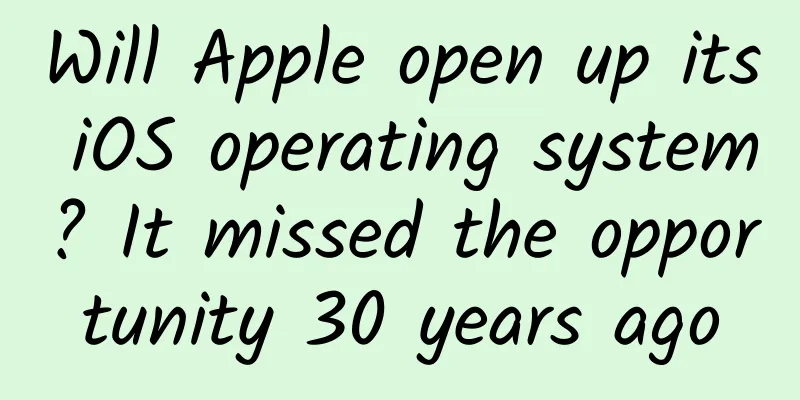Will Apple open up its iOS operating system? It missed the opportunity 30 years ago

|
US financial website Marketwatch wrote on Thursday that as iPhone shipments fell for the second consecutive quarter, Apple, which is at a crossroads, should make a decision to open up its iOS operating system to hardware competitors through a fearless move. Although this move may affect the iPhone business, it will double Apple's service business and maintain the company's long-term stable development. The following is an excerpt from the article:
In June 1985, Bill Gates wrote to John Sculley, then Apple CEO, and Jean-Louis Gassée, then head of Mac development, urging them to hurry up and license Apple's operating system to other companies. Apple ignored Gates' advice. Five months later, Microsoft released its own operating system, Windows. Since then, Microsoft has become the ruler of the PC industry, and Apple has embarked on a path of decline. By investing $150 million in Apple in 1997, Microsoft saved Apple from bankruptcy. There are many ways to interpret this historical lesson, but one thing is clear: developing an open platform gave Microsoft a huge advantage. It is true that Steve Jobs led Apple to a resurgence and made the company the world's most valuable company by focusing on designing and integrating hardware and software. But it came too late and Apple missed the opportunity at the end of the last century. People can't help but ask, what would have happened if Apple had listened to Gates' advice? History certainly won’t repeat itself, but Apple is once again at a crossroads. The company’s innovation engine has essentially stalled, and it’s been nearly nine years since the company’s last most important product, the iPhone, was released. Apple’s earnings have fallen for two consecutive quarters due to declining iPhone shipments. While the company’s results were better than expected, they were based on lower expectations. The main reason for Apple's profit decline is that the company has no bold new products. Chinese competitors Huawei and Xiaomi currently sell devices that are comparable to the iPhone in hardware but are much cheaper than the latter. Because of this, the iPhone's share of the Chinese market has fallen from 16% in 2015 to less than 13% this year. Apple no longer even has the best products. In the list recently released by Consumer Reports, Samsung Electronics' flagship smartphone Galaxy S7 has surpassed the iPhone 6s. In the consumer satisfaction survey, Samsung Electronics also ranks ahead of Apple. Apple's share in the global smartphone market has also begun to falter. Market research company Gartner said that global smartphone shipments grew by 3.9% in the first quarter of this year. Among them, Android's share climbed to 84.1%, while Apple's share fell from 17.9% in the same period last year to 14.8%. Apple doesn't dominate the mobile operating system market like Alphabet's Google does. Instead, its share of the growing market has begun to slip. And while Apple has the highest profits in the smartphone industry, data suggests that can't last forever. As everyone begins to question Apple's ability to innovate again, the company must make a dramatic shift before the spell wears off. Apple should follow Gates' advice and offer its operating system to other platforms. Today, full-featured smartphones are priced at $50 in markets such as China and India, and could drop to less than $25 in the next three to four years, with billions of consumers buying them. The smartphone market is still in its infancy, and Apple should open up iOS to smartphone makers like Samsung Electronics, LG, HTC, Xiaomi and others. If it responds in time, Apple still has a chance to replace Google's Android and become the world's leading smartphone platform. If Apple opens up its iOS operating system, new users will download new apps through the App Store, download music through iTunes, or become Apple Music subscribers. When Apple releases its long-developed streaming video service, it will have a potential user base of billions. Apple is fully capable of increasing its current $6 billion in service revenue several times over. In terms of revenue, service revenue is now Apple's second largest business after the iPhone. Unlike hardware, the service business does not require engineering and has much higher profit margins. Will opening up iOS affect iPhone revenue? Of course it will, but when iPhone revenue declines, Apple needs to find alternative revenue channels. Can iOS run on non-Apple devices? The answer is yes. Apple can tweak iOS to run on other devices. Hackers have demonstrated this technique for years. In 2013, hackers got Nokia's N900 to run iOS. Given that the vast majority of accessories for the iPhone come from third-party vendors, there are very few exclusive accessories for the iPhone. Allowing other devices to run iOS would certainly eliminate the key competitive advantage that the iPhone currently enjoys, but it would bring Apple a lot of new revenue and allow Apple to survive better, allowing it to focus on developing better software and innovative hardware. We need Apple to release unparalleled new products, not just sit back and enjoy the advantages of the past. |
<<: WOT2016 Wang Qingyou: Listen to the Chief Architect Discussing Large APP Server Architecture
>>: Discussion on the technical architecture and application model of mobile payment
Recommend
Why do most startup marketing fail?
The author of this article will explain the mista...
The number of cockroaches in Spain has increased sharply, which is related to global warming | Environmental Trumpet
Hello everyone, this is the 9th issue of the Envi...
How Weibo red envelopes replicated the magic of the Ice Bucket Challenge
Red envelopes are given out every year, but this ...
How to use the WeChat restaurant ordering app? Do these things to double your store's performance!
Since Zhang Xiaolong launched WeChat Mini Program...
Cross-border B brother-tiktok advertising quick start course
A comprehensive explanation of the practical oper...
Which chip has better performance? Qualcomm Snapdragon 801 vs HiSilicon 920 chip
Looking back at the first half of 2014, the domes...
Who can put an end to the prestige of the “4G Overlord Package”?
According to the China Consumers Association, it ...
Internet finance operation: one picture analyzes user operation!
The work content of user operation is complex and...
How to use the points system to stimulate user retention
A reasonable points system generally consists of ...
I have an implementation plan that can make 100 million yuan. Are you willing to do it?
This article is suitable for: those who hope to a...
Xi'an: Eligible individuals will receive a subsidy of 10,000 yuan for purchasing new energy vehicles
On May 31, the reporter learned from the Shaanxi ...
TechInsights: China's chip equipment procurement is expected to drop to US$38 billion in 2025, a year-on-year decrease of 6%
China's purchases of chipmaking equipment wil...
Why do we like spicy food?
Most of the peppers we talk about now come from f...
Sweet Trap——“Healing Sweets” or “Sweet to Sadness”?
● It’s not good to eat sweets. ● Eating sweets ca...
Do males want to be eaten after mating? They go to great lengths to survive
There are some magical phenomena in nature. For e...





![Liu Kunkun's 2021 Zero-Based Commercial Illustration Course, Phase 3 [HD]](/upload/images/67cc1fa5ce9ce.webp)



